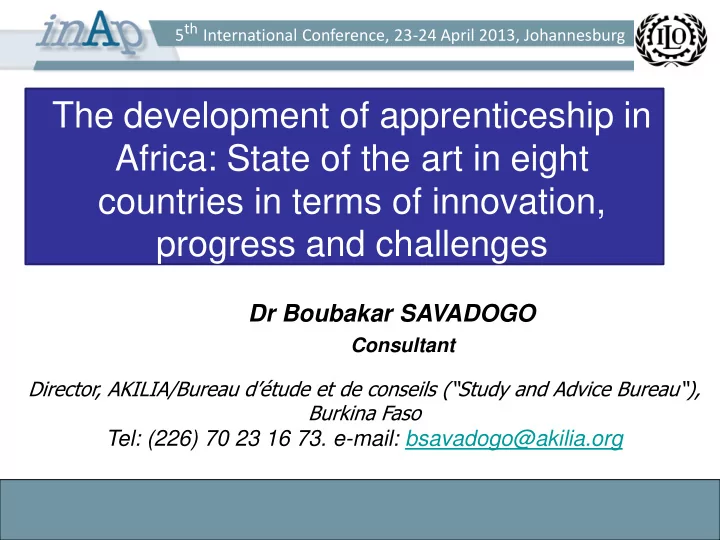

5 th International Conference, 23-24 April 2013, Johannesburg The development of apprenticeship in Africa: State of the art in eight countries in terms of innovation, progress and challenges Dr Boubakar SAVADOGO Consultant Director, AKILIA/Bureau d’étude et de conseils (“Stu dy and Advice Bureau “), Burkina Faso Tel: (226) 70 23 16 73. e-mail: bsavadogo@akilia.org
5 th International Conference, 23-24 April 2013, Johannesburg The countries of the West African Economic and Monetary Union (UEMOA) 2
5 th International Conference, 23-24 April 2013, Johannesburg FACTS AND FIGURES FOR THE COUNTRIES OF THE UEMOA % of the % of public % completed % who enter secondary education Population primary Literacy rates secondary students in budget education education the EFTP dedicated to the EFTP Benin Burkina Faso 20-70% of Côte d'Ivoire adults (aged Guinea Bissau 55-65% aged 40-60% 15-60) et 25- 15-35% 2-8% 5-10% under 25 Mali 85% of people aged 15-25 Niger Senegal Togo 3
5 th International Conference, 23-24 April 2013, Johannesburg FACTS AND FIGURES FOR THE COUNTRIES OF THE UECOA Number of places Trades in the % of trades in Number of provided in artisan sector formal EFTP apprentices formal EFTP 210 Benin 110 Burkina Faso 244 Côte d'Ivoire n/a Guinea Bissau 200,000- 4-15% 5,000-60,000 1,800,000 171 Mali 206 Niger 122 Senegal 140 Togo 4
5 th International Conference, 23-24 April 2013, Johannesburg Formal and informal jobs within the UEMOA 100% 90% 80% 70% 60% 50% 40% 30% Secteur formel 20% 10% Secteur informel 0%
5 th International Conference, 23-24 April 2013, Johannesburg Tools for apprenticeship development 1. Establishment of sectoral associations 2. Detailed definition of the content of trades and development of training programmes 3. Training for trainers (formal and home-grown) 4. Introduction of a dual system to make formal training centres accessible to those in informal apprenticeships 5. Allocation of finances to fund the training 6. Creation of new qualification certificates within the formal EFTP system to recognize the qualifications of apprentices from the informal sector
5 th International Conference, 23-24 April 2013, Johannesburg AN APPRENTICE’S JOURNEY TO CERTIFICATION IN SENEGAL Professional Apprenticeship Certificate = Certificate of professional competence (CCP) 1 7
5 th International Conference, 23-24 April 2013, Johannesburg IVORY COAST • 1994 to 2002, 17 districts of Cote d’Ivoire • Since 2002, 11 districts What, when and • 17 sectors [food – dressmaking – hairdressing – metalworking - woodwork for 1 where? cars – electrics for cars – industrial electrics – electrics for construction - refrigeration – electronics – general mechanics – motor rewinding – car spraying – machining – plumbing] • 1996 to 2010 No. of out-of-school young people 13,215 young people 2 recruited 2,548 apprentices in training each year from 2012 (this is the ambition) No. of apprentices • 3,719 apprentices in 2010 obtaining 3 • 4,719 apprentices in 2012, i.e. 35.7% of the total number registered certificates • 4,719 have obtained their certificates • Insertion des certifiés interrogés:40% (embauche 32% - auto emploi 68%) Potential for • 2,614 left in their first year 4 inclusion • 5,882 not yet certified (inclusion, did not obtain certification, left early) • 10,601 young people who could potentially be included 8
5 th International Conference, 23-24 April 2013, Johannesburg MALI Surveys conducted among business owners 10 years after the launch of the new apprenticeships have shown that apprenticeships have had a positive effect for employers: • On the quality of work (91.2%), • On compliance with deadlines (80.7%), • On customer service (89.3%) and • On the way the workplace is run (73.7%)
5 th International Conference, 23-24 April 2013, Johannesburg ANNUAL UNIT COST OF TRAINING 3000000 2500000 2000000 1500000 1000000 Informal Formal 500000 0
5 th International Conference, 23-24 April 2013, Johannesburg The end! 11
Recommend
More recommend